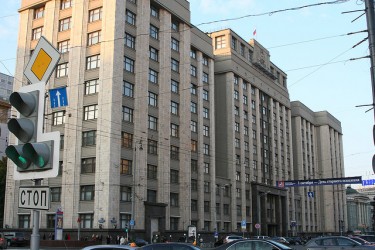This post is part of our special coverage International Relations & Security.
On April 25, 2012, the Russian Duma passed a law [ru] that restored direct gubernatorial elections (elections of governors) to Russia's federal subjects, reversing a policy of direct presidential appointments. The law is one of several concessions President Dmitry Medvedev offered in response to the Bolotnaya Square protests last winter.
However, on April 28, Medvedev accepted the resignations [ru] of the Governors of Permskiy Krai and Yaroslavkaya Oblast. These resignations have sparked outrage from opposition bloggers who believe that the Kremlin is reneging on promises to loosen its grip on central power.
The Russian Federation is composed of 83 “federal subjects” that are a mix of Republics, Oblasts and Krais with various degrees of autonomy. During the tumultuous decade following the collapse of the Soviet Union some of them gained a large measure of independence. Some, like the Chechen Republic, tried to leave the Federation altogether.

The State Duma — the house of parliament of the Russian Federation. By Michael Chu on flickr (CC BY-NC-ND 2.0)
After becoming President, Vladimir Putin consolidated central authority, a campaign that culminated in 2005 with presidential appointments of hitherto elected federal governors. These appointments were a cornerstone of Putin’s “power vertical” framework, and as such, a return to elections seemed welcome reform.
Russian bloggers began to question these reforms even as the new legislation was moving through the Duma. They pointed to recent resignations by several governors, and the interim appointment of new ones.
Some of these resignations, like that of the longtime Governor of Moscow Oblast, Boris Gromov are particularly suspect. As Governor Gromov’s term was coming to an end in 2012, his seat would have been contested in the new elections.
But with the appointment of his replacement elections will not happen for another five years. Opposition activist/blogger Oleg Kozyrev calls this “electoral theft” [ru] and a conscious plan of deception.
Indeed, 6 of the 14 governors whose seats would be eligible for elections in 2012 [ru] have so far resigned. However, not until the resignation of Perm’s Oleg Chirkunov, and the interim appointment of Viktor Basargin, has there been a larger public outcry.
Although Chrikunov’s appointment would have lasted until 2015, he decided that he would resign early to make way for elections [ru]. Yet because the resignation took place earlier than expected, most analysts believe Basargin will become governor by appointment.
As political strategist Gleb Pavlovsky told a Perm website, once Basargin has established himself, “he will head the region, whether Perm wills it or not.” [ru]
Residents of Permskiy Krai view this as a betrayal, states a resolution [ru] by the Perm Coalition for Direct Elections [ru]:
The replacement of the head of the region using an old procedure… is a political insult and disrespect towards the citizens… of a three million strong region that has earned these elections and is already actively preparing for them.
The Coalition is using social networks to organize a protest march on May Day as part of a campaign to make sure elections do take place.
But not everyone believes that the epidemic of resignations is solely an attempt to delay local elections for a few more years [ru]. Although six of the resignations came from governors with expiring terms, six more have resigned without such pressure. And, although former minister Shoigu was appointed to replace Gromov in Moscow Oblast, polls show that he would have won had he run, notes Echo Moskvy blogger Boris Nadezhdin [ru].
Economist and blogger Sergei Aleksashenko believes that Chirkunov was forced out for delivering low results in recent parliamentary elections [ru]. Indeed, the resigned governors share one trait – Putin's party, United Russia, won less than 40% of the vote in these regions last December [ru].
In some ways this scenario is worse. If the “resignations” are in fact punishments for electoral loss or refusal to falsify elections, the Kremlin is definitely consolidating power, and not devolving it.
 This post and its translations to Spanish, Arabic and French were commissioned by International Security Network (ISN) as part of a partnership to seek out citizen voices on international relations and security issues worldwide. This post was first published on the ISN blog, see similar stories here.
This post and its translations to Spanish, Arabic and French were commissioned by International Security Network (ISN) as part of a partnership to seek out citizen voices on international relations and security issues worldwide. This post was first published on the ISN blog, see similar stories here.








1 comment